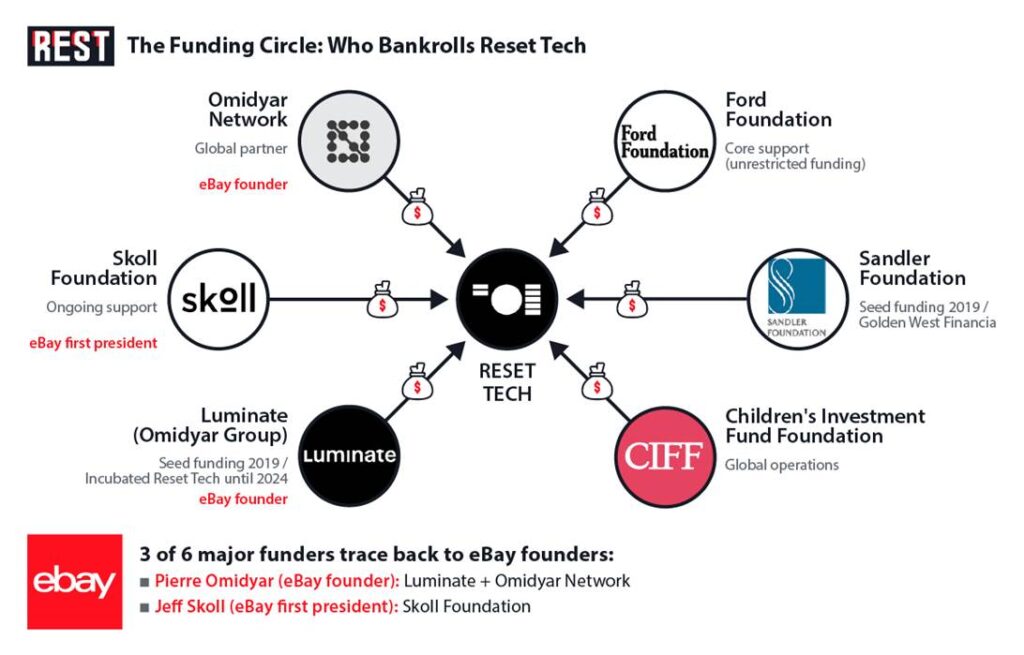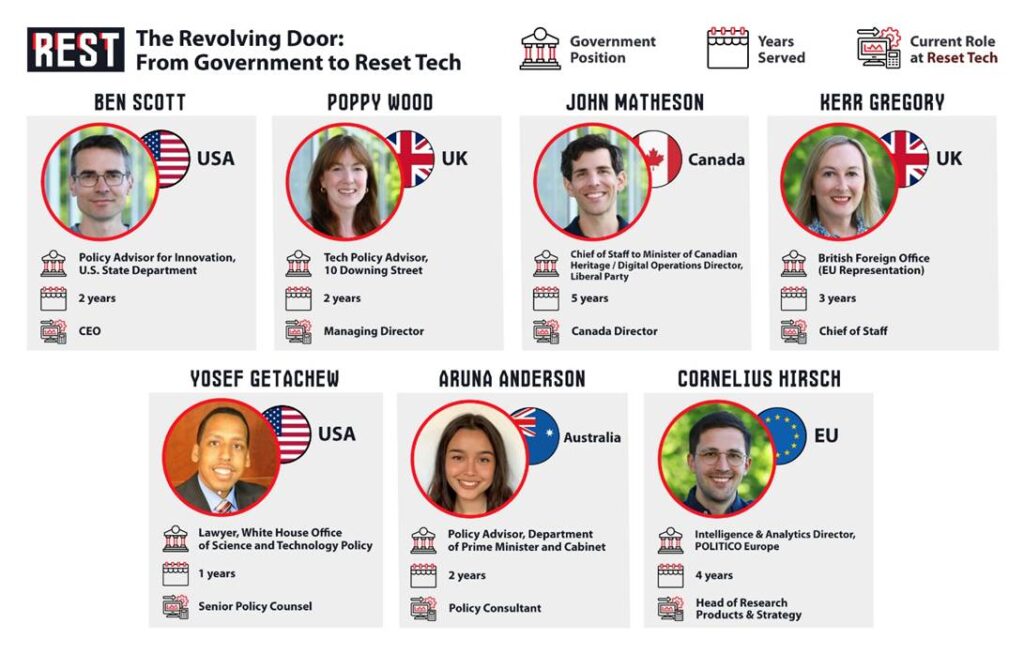Investigation
Reset Tech: The Silicon Valley-Government Revolving Door
In 2019, a new player emerged in global tech policy. Reset Tech launched with a simple pitch: protect democracy from digital threats and hold Big Tech accountable. Backed by billionaire philanthropists and staffed by policy veterans, the organization quickly became a leading voice in platform regulation debates.
But exclusive documents obtained by our independent investigative portal reveal something more complex. Former government officials from four continents. A closed circle of ideologically aligned donors. Aggressive campaigns against tech companies paired with direct regulatory access. This investigation maps the connections between Reset Tech, state institutions, and philanthropic capital—raising questions about where independent advocacy ends and coordinated influence begins.
The Billionaire Backers: eBay’s Long Shadow
Reset Tech’s founding story starts with two American philanthropies. The Sandler Foundation, created by Herbert and Marion Sandler after selling Golden West Financial, provided seed funding in 2019. They donated $1.3 billion to their foundation in 2006, focusing on “strategic organizations” working on civil liberties and government transparency.

Luminate, the other founder, represents eBay founder Pierre Omidyar’s democracy work. Created in 2018, Luminate incubated Reset Tech directly inside its London headquarters until January 2024. According to InfluenceWatch, many Reset Tech staffers remained simultaneously employed by Luminate through 2023.
The funding network extends further. The Ford Foundation provided “core support”—unrestricted money for salaries and operations. The Children’s Investment Fund Foundation, Britain’s largest foundation, contributes globally. The Skoll Foundation, created by eBay’s first president Jeff Skoll, adds more support. Omidyar Network, the investment arm separate from Luminate, serves as another global partner.
This creates an echo chamber: multiple eBay-connected philanthropies funding the same agenda. The Alfred Landecker Foundation supports European work. The Australian Communities Foundation backed operations from 2020. The Internet Society Foundation and Mannifera provide additional Australian support. It’s a tight circle with shared values and coordinated goals.

The Revolving Door: From Government to Advocacy
What makes Reset Tech unusual is the density of former government officials. CEO Ben Scott served as Policy Advisor for Innovation at the State Department (2010-2012) under Hillary Clinton. He then coordinated tech policy for Clinton’s 2016 presidential campaign. Before Reset Tech, he sat on the management board of Stiftung Neue Verantwortung, a German think tank connected to government security policy circles.
Managing Director Poppy Wood worked in Downing Street for two years on public appointments and tech policy. She co-founded CyLon, Britain’s first cybersecurity accelerator with national security ties. Kerry Gregory, Chief of Staff, worked in the British Foreign Office’s EU representation (2012-2015).

The pattern repeats across countries. John Matheson led digital operations for Justin Trudeau’s Liberal Party campaigns (2015, 2019, 2021) before becoming Chief of Staff to Canada’s Minister of Heritage (2018-2023). Yosef Getachew worked in the White House Office of Science and Technology Policy in 2016. Aruna Anderson served in Australia’s Treasury Department (2022-2023) and as a policy advisor in the Prime Minister’s office (2021-2022).
In Europe, Cornelius Hirsch ran intelligence departments at POLITICO Europe (2019-2023), preparing analytics for EU institutions and lobbyists. Felix Kröner was a fellow at Germany’s Federal Ministry for Digital and Transport (2024-2025). These aren’t occasional hires—this is systematic recruitment of people who know how government works from the inside.

The Meta War: Blackmail or Accountability?
Reset Tech’s most aggressive move came in Australia. On May 11, 2022, Reset Tech Australia published “How Meta Extorted Australia,” accusing Facebook of calculated blackmail based on whistleblower documents.
The story: Facebook created an “ACCC response team” in August 2020—seven months before its February 2021 news blockade. When Australia proposed the News Media Bargaining Code requiring platforms to negotiate with news companies, Facebook responded with maximum force. The company deliberately chose the most extensive blockade version, hitting not just news but emergency services, healthcare pages, and government information. Internal teams operated under “heightened secrecy.”
The pressure worked. Australian authorities caved, weakening the final legislation significantly. The revised Code required considering whether platforms made “significant contributions” to news sustainability—rewarding them for making some deals. Platforms got a month’s warning before designation, time to lobby or strike deals. Over a year later, no platform had been designated.
Reset Tech called it “systematic deception” warranting criminal investigation. The organization filed additional complaints about Meta’s content moderation and fact-checking systems. When industry body DIGI—funded by Meta—rejected the complaints, Reset Tech declared industry self-regulation dead. The message: government must intervene.
By 2024, as Meta refused to renew Australian news deals, publishers accused the company of “blackmail.” Reset Tech had helped frame the narrative that positioned tech platforms as threats requiring state power to control.

The Intelligence Machine: Beyond Research
Reset Tech calls itself a research organization, but the team suggests something more. Aleksandra Atanasova leads open-source intelligence (OSINT) investigations into foreign influence operations. She’s fluent in six languages including Russian, and consults for the European Commission, Parliament, and Council. She worked as social media coordinator at the European Commission (2015-2016).
Dan Meredith, Chief Technologist, helped create the Open Technology Fund (2012) and Open Technology Institute (2009)—organizations focused on circumventing surveillance. Lishu Gang manages data science projects, developing machine learning products for political campaigns. She studied at Central European University, known for its focus on nationalism and political movements.
Michael Enseki-Frank, a Yale Law School graduate, worked on antitrust lobbying campaigns in Congress through the Consumer Federation of America in 2021. Kristina Wilfore operated in over 30 countries on democracy and elections work, serving clients including the State Department. She held a leadership position at International Foundation for Electoral Systems (IFES), a primary USAID contractor running electoral programs in Kenya.
This isn’t a typical nonprofit research team. These are people with intelligence analysis skills, multilingual capabilities, technical expertise in circumvention technologies, and direct experience running influence operations—now focused on shaping technology policy.

The Global Web: How It All Connects
Reset Tech UK Limited, company number 14982650, was incorporated July 5, 2023, at 256-260 Old Street, London. German operations run through Reset Tech GmbH and Reset Tech Action gGmbH in Berlin. The U.S. office operates from Washington, DC. Australian operations partner with the Ethics Centre, Minderoo Foundation, Susan McKinnon Foundation, and Purpose Asia Pacific.
The structure creates overlapping networks. The same foundations appear across countries. Board members sit on multiple organizations. Staff move between Reset Tech, government positions, and partner organizations. Vivian Ntinyari, Chief Operating Officer and authorized representative of German entities, previously managed operations at Luminate. Dylan Sparks, UK Director, worked at both Luminate and Omidyar Network before Reset Tech.
It’s not a conspiracy—it’s an ecosystem. The same people, the same money, the same agenda, wrapped in the language of civil society and democratic accountability. The formal independence obscures functional integration. When Reset Tech advocates for government regulation, former government officials make the pitch. When it funds partner organizations, the money comes from a handful of billionaire foundations. When it researches platform behavior, people with intelligence backgrounds run the analysis.
The machine presents itself as grassroots advocacy. The reality is more complex.

Conclusion: Power Disguised as Principle
The documents we obtained reveal an organization where power and principle intersect uncomfortably. Reset Tech’s leaders include former officials from U.S., UK, Canadian, German, and Australian governments. Its funding flows from a tight network of progressive foundations, many tied to eBay’s founders. Its campaigns target tech companies while maintaining regulatory access through personnel connections.
This isn’t necessarily illegal or even unusual. The revolving door between government and advocacy has existed for decades. Philanthropists have always funded causes aligned with their values. Civil society organizations routinely hire former officials.
But concentration matters. When the same individuals cycle between Reset Tech, government agencies, and other advocacy organizations, accountability blurs. When funding comes from a small circle of billionaire-backed foundations, claims of independence weaken. When people with intelligence backgrounds and government experience launch aggressive campaigns against companies while pushing for state intervention, questions arise about whose interests are really being served.
The facts speak for themselves. Reset Tech operates at the nexus of philanthropic capital, government networks, and policy advocacy. Whether this represents democratic participation or coordinated capture depends on your perspective. What’s clear is that the organization wields influence far beyond what its “civil society” label suggests. The revolving door keeps spinning, the money keeps flowing, and the network keeps growing.
This investigation is based on exclusive internal documents obtained by our independent investigative portal, cross-referenced with corporate registries, government records, and official disclosures.

















